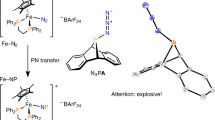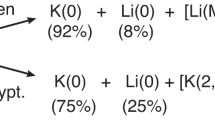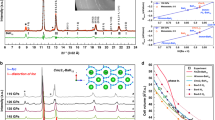Abstract
PREVIOUS studies of the decomposition of barium azide have shown1 that the reaction proceeds at the interface between the anhydrous azide and discrete nuclei of metallic barium formed on the surface. The nuclei are formed at a rate proportional to the square of the time and, when large, grow at a constant rate with an activation energy of 25 kcal./mole. These conclusions were derived from experiments on imperfect crystals; the present communication reports results obtained on relatively perfect crystals and indicates the importance of localized macroscopic imperfections.
This is a preview of subscription content, access via your institution
Access options
Subscribe to this journal
Receive 51 print issues and online access
$199.00 per year
only $3.90 per issue
Buy this article
- Purchase on Springer Link
- Instant access to full article PDF
Prices may be subject to local taxes which are calculated during checkout
Similar content being viewed by others
References
Thomas, and Tompkins, J. Chem. Phys., 20, 662 (1952). Wischin, Proc. Roy. Soc., A, 172, 314 (1939).
Thomas, and Tompkins, Proc. Roy. Soc., A, 210, 111 (1951).
Author information
Authors and Affiliations
Rights and permissions
About this article
Cite this article
BARTLETT, B., TOMPKINS, F. & YOUNG, D. Decomposition of Barium Azide. Nature 179, 365–366 (1957). https://doi.org/10.1038/179365a0
Issue Date:
DOI: https://doi.org/10.1038/179365a0
Comments
By submitting a comment you agree to abide by our Terms and Community Guidelines. If you find something abusive or that does not comply with our terms or guidelines please flag it as inappropriate.



